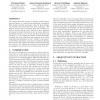Free Online Productivity Tools
i2Speak
i2Symbol
i2OCR
iTex2Img
iWeb2Print
iWeb2Shot
i2Type
iPdf2Split
iPdf2Merge
i2Bopomofo
i2Arabic
i2Style
i2Image
i2PDF
iLatex2Rtf
Sci2ools
108
click to vote
DMKD
2003
ACM
2003
ACM
Using transposition for pattern discovery from microarray data
We analyze expression matrices to identify a priori interesting sets of genes, e.g., genes that are frequently co-regulated. Such matrices provide expression values for given biological situations (the lines) and given genes (columns). The frequent itemset (sets of columns) extraction technique enables to process difficult cases (millions of lines, hundreds of columns) provided that data is not too dense. However, expression matrices can be dense and have generally only few lines w.r.t. the number of columns. Known algorithms, including the recent algorithms that compute the so-called condensed representations can fail. Thanks to the properties of Galois connections, we propose an original technique that processes the transposed matrices while computing the sets of genes. We validate the potential of this framework by looking for the closed sets in two microarray data sets.
Related Content
| Added | 05 Jul 2010 |
| Updated | 05 Jul 2010 |
| Type | Conference |
| Year | 2003 |
| Where | DMKD |
| Authors | François Rioult, Jean-François Boulicaut, Bruno Crémilleux, Jérémy Besson |
Comments (0)

